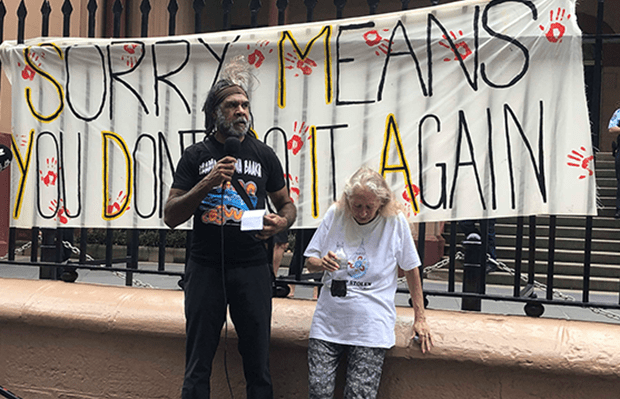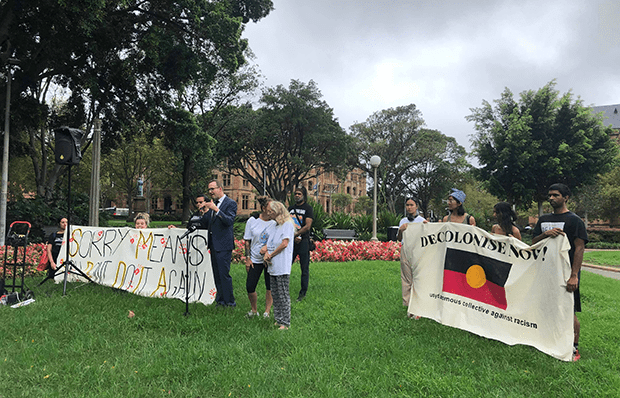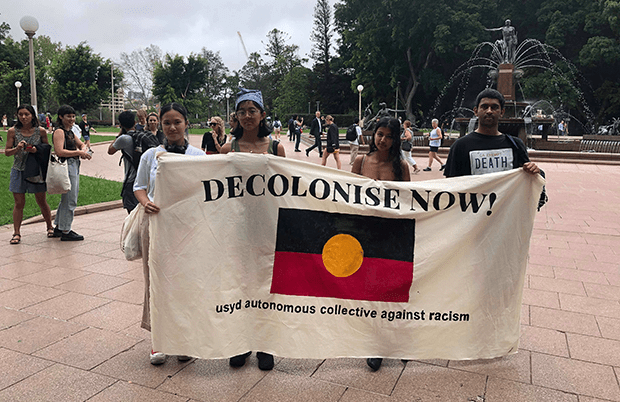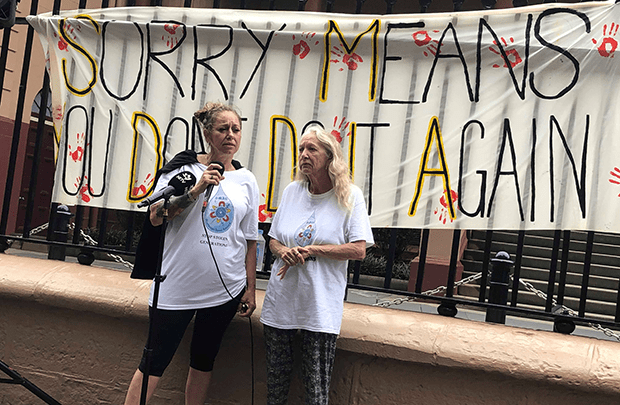Marking 12 years since former Prime Minister Kevin Rudd’s apology to the Stolen Generations, Grandmothers Against Removals (GMAR) held a rally on Thursday against continued child removals under the guise of protection. Around 50 people met at Hyde Park Fountain at midday and marched to NSW Parliament, on unceded Gadigal Land. The protest sent a strong message to end the abduction of Aboriginal children from their homes, communities and culture.

The rally comes four months after the ground-breaking Family is Culture Review into Aboriginal out-of-home care, which revealed the system to be a complete failure that perpetuates intergenerational trauma in First Nations communities. The three year independent study led by Professor Megan Davis highlighted that Aboriginal children are increasingly and disproportionately targeted by the out-of-home care system. She called for alternatives to removal including Indigenous-led services and community healing.
NSW Greens MLC David Shoebridge condemned the government for making “no effort to implement those key recommendations”. Aboriginal children are ten times more likely to be placed in out-of-home care than non-Indigenous children and the rates are now higher than that of the Stolen Generations. Shoebridge drew attention to how child authorities displace First Nations children from their culture “largely for the crime of their families being poor.”
In response to the news that Rudd and other politicians were at a breakfast at Parliament House on the morning commemorating the anniversary of the apology, Hazel Collins, GMAR’s founder, questioned the tokenism of Rudd’s famous apology.
“If Kev really meant sorry, then why isn’t he down here? …The only reason that man said sorry is because it was a political move.”

A focal point of the rally was challenging the myth that the Stolen Generations had ended. Bruce Shillingsworth, a Muruwari and Budjiti artist and water for rivers activist, who gave the Acknowledgement of Country, read Rudd’s apology statement outside Parliament House and encouraged the crowd to yell ‘shame’ at the end of each sentence.
“For the breaking up of the families and communities we say sorry, but I say shame!” “Things have not changed since the apology. We are still suffering from those policies that affected us in the past. Those traumas have now been passed on to our next generation.”
All speakers condemned the Government for claiming to provide a safe place through out-of-home care where there are reports of children being physically, sexually and mentally abused. Hazel Collins questioned why children have died in out-of-home care and compared it to the crisis of black deaths in custody, stating that, “I feel anger at a government that continues to legalise genocide.”
“The government takes our children, supposedly to protect them, but what they do is they take them from us all, the whole family and whole community.” Collins spoke about her own experience growing up without knowledge of the traditional language spoken by her grandparents, decrying this loss of culture as a crime that the government owns the responsibility of.
Peter Moore also spoke to his experience as an adoptee and the trauma of discovering he had been lied to. Moore urged prospective adoptive parents to consider the destructive impacts separation from culture has on children, particularly First Nations children.
Collins also highlighted how white-settler Australians would never be subjected to the same government policies. “I wonder how [Scott Morrison] would like it if someone went in and stole his kids? …One day he could be in our position, but he won’t because his ass is white.” “Many people flock here because they think it’s a lucky country. Well it is for some; it is for the privileged few. But what Australia needs to understand, it’s not if you’re First Nations.”

Helen Eason closed the rally off with a powerful speech, echoing Shillingsworth and Collin’s calls for First Nations people to rise up and make the government accountable for the crimes it continues to commit. “We come from strong ancestry, we are warriors and we are survivors,” she said. “Why aren’t our services and Aboriginal organisations good enough? We don’t want to use your services; we’re continually falling through your service gaps.”
As of February 2020, there are 17,979 Aboriginal and Torres Strait Islander children living in out-of-home care (an increase of 39% from last year’s Review on Government Services report).





